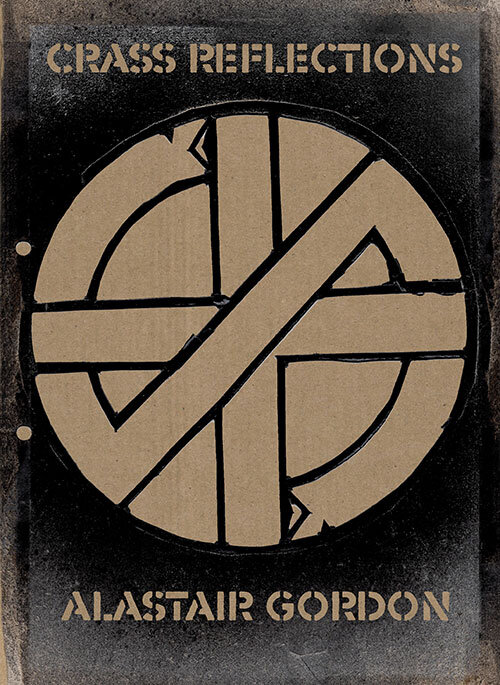Itchy Monkey Press is an independent publisher specialising in writings on punk rock. With an initial release of Ted Curtis’ the darkening light, a novel based on the north London anarcho-punk scene of the 1980s, Itchy Monkey then saw the release of the much-awaited Tales From the Punkside, edited by founder Mike Dines and radical thinker Greg Bull. Tales From the Punkside is a work that pulls together prose, poetry, art and the academic to express the everyday in punk. Written in the style of an ‘anarcho-narrative’, the book is an attempt to present punk in an intelligent and thoughtful light without getting bogged down by the academic. The volume is therefore an easy read, and includes chapters on squatting, women in punk and glue sniffing. As a follow up, Itchy Monkey published Some of Us Scream, Some of Us Shout: Myths, Folklore and Epic Tales of the Anarcho (2016), Alastair Gordon's monograph Crass Reflections (2016) and And All Around Us Was Darkness (2017). Latest editions include two books of poetry, Factories Run By Robots (2018), Gagging Order (2019) and I Want Out (2020).
Please visit http://itchymonkeypress.com
the darkening light
By Ted Curtis
In the spring of 1986, nine young punks travelled from Swindon to Wood Green in a beat up old van, to see Atavistic, Eat Shit, Heresy and others blow the socks off the London borough of Harringay. In the 24 hours that followed their lives would be forever changed. What was going to happen? Would it be the vegan revolution? A declaration of world peace? Or something more sinister? This cavort through the anarcho-punk and hardcore scene of the mid-1980s pulls no punches. From the very first page, once you start reading this coruscating tale you won’t be able to stop, and by the time you finish your life will be changed too. If you think you were there, you weren’t. Whatever you think happened, whatever you remember, this wasn’t it. This is something else entirely, a perfect snapshot, a dishevelled stream of consciousness yielding a surprisingly moving and unabridged account of blackouts, nightmare bogs and hardcore corrosion. It is an invaluable addition to the canon. Chaos with a heart.
tales from the punk side
Edited by Gregory Bull and Mike Dines
An anthology of work about punk written by the survivors and by those who want the world to see not just writings from those who were in the bands, but by those who were the supporters of the punk movement. In other words, the telling of everyday punk narratives by those who were there but had never previously written them down – the squatting, the drinking, the glue sniffing. The writing of being a provincial punk; of starting up your own punk band (that lasted for 3 months); or of missing your favourite band play live because your mum wouldn’t let you go out ‘looking like that’. Tales From the Punkside is an eclectic collection of academic articles, personal recollections, short stories, artwork, poetry and more.
some of us scream some of us shout
Edited by Greg Bull and Mike Dines
Some of Us Scream, Some of Us Shout: Myths, Folklore and Epic Tales of the Anarcho is the second in the Tales From the Punkside series. Whereas the self-titled first volume encompassed the wider punk scene, Some of Us Scream… brings together the stories, the artwork and the inspiration of the anarcho-punk scene from the 1980s to the present day. As with Tales… stimulus has come from the everyday, from those who were there and from those who have personal accounts to convey. Too often a scene such as anarcho-punk becomes defined by its canon, its key players. In this case, they are often (amongst others) Crass, Conflict, Rudimentary Peni, the Subhumans and Flux of Pink Indians (who, ironically, the editors would like to thank for the title of this book). The editors do not wish to detract from their stories but merely add to them, to document those who were inspired by the music, those who (in their own ways) further contributed to the scene.
And all around was darkness
Edited by
Gregory Bull and Mike Dines
And All Around Was Darkness is the third in the Tales From the Punkside series; a collection of books whose main concern is to provide a space for stories, anecdotes and various other shenanigans by those persons rarely heard – the fans and everyday participants in the punk movement. Books are often written by – or about – those who have some kind of ‘status’ in punk circles. Instead, And All Around Was Darkness, alongside Tales From the Punkside and Some of Us Scream, Some of Us Shout… continues to highlight the egalitarian nature of punk.
FACTORIES RUN BY ROBOTS
Edited by Mike Dines
There is a long tradition of poetry in punk, from Patti Smith to John Cooper Clarke, Attila The Stockbroker and Henry Rollins to Billy Childish. Then there were the Oi! Poets, anarcho-punk poets like Andy T. and Nick Toczek, and the Ranting Poets, Joolz, Seething Wells, etc. Factories Run By Robots is a showcase of thirteen disparate poets from the punk community, containing a mixture of work that covers gallows humour alongside lamentations on the state of the world and the role of the State. Personal, political, purposeful, proselytising punk rock poetry. Some of it is pretty stark and very dark but it’s full of negative-drive and anger-as-an-energy.
Gagging order
By Trevor Paviour
Trevor Paviour’s work was first published in the Itchy Monkey Press anthology of poetry Factories Run By Robots in 2018. Trev’s poetry is often raw and, at times, shocking, but always tragic. His talk of sexual abuse in ‘Religion’ and ‘The Born Again Christian,’ shocks the reader, while his writing of lost love in ‘Seven Year Itch,’ of the ‘old folks boot camp’ in ‘What Goes Around Comes Around,’ and the monotonous grind of the 9 to 5 in ‘Get Up Go To Work, Come Home Go To Bed,’ highlight a subtlety of writing. Accompanying these poems are the paintings of Pompey-based artist Kevin Fitzjohn. Alongside Trev, Kev has been a stalwart of the south-coast scene for decades, first getting into punk in his teenage years growing up in Leigh Park. As a self-taught artist, Kev’s work fuses together imagery from punk, politics and popular culture. His work fits the imagery of the poetry perfectly, especially in the tragic figure of Sid Vicious.
CRASS REFLECTIONS
By Alastair Gordon
Comprising of an undergraduate monograph and essays written in the mid-1990s, this work critically examines the work of the anarchist punk band Crass in light of a then academic lack of discussion of their activities in cultural studies writings on punk. The broad thesis of the work interrogates links between critical theory and Frankfurt School perspectives on art and subversive culture, and Neo-Marxist accounts of phylogeny. There are critical discussions around the tensions and similarities between Crass and Neo-Marxist accounts of the role of dominant ideology (traditional notions of false consciousness/media effect) in contrast to the cultural monopoly of survival needs as the central motor of social reproduction in capitalist culture. The book concludes with a discussion of the importance of the legacy of Crass and the need for future research. Written before the groundswell of punk scholarship, it serves as vindication of its obscure and early importance.
I Want Out
By Stephen Spencer-Fleet
Stephen Spencer-Fleet’s evocative, stripped-back style of poetry first appeared in the Itchy Monkey Press book Some of Us Scream, Some of Us Shout (2015). Entitled ‘I Changed My World,’ and delivered in the form of a short, prose-like poem, the author began with a declaration of intent: ‘From 1979 I felt that I needed to overthrow the government and change the world.’ He continued, ‘I started with a zine, a band and a leaflet home production line’ kick-starting an ‘urgent period of my life [which] brought me into contact with many great people, some formative life experiences and a type of radical politicisation that has stayed with me over the subsequent decades.’ Spencer-Fleet’s poetry is often redolent, utilising a stripped-back style of writing that draws upon single words and short phrases as forms of expression. There is a nod to Kerouac’s stream of consciousness; to William Burroughs-style cut ups and visions; and to a punk template of shock tactics, of being raw and honest. I don’t want to ‘introduce’ the poems you have before you. I don’t want to give you a hint, or a forewarning of subject matter. All I can say is that you will not be disappointed. To paraphrase, Spencer-Fleet is tough: fucking hardcore.










